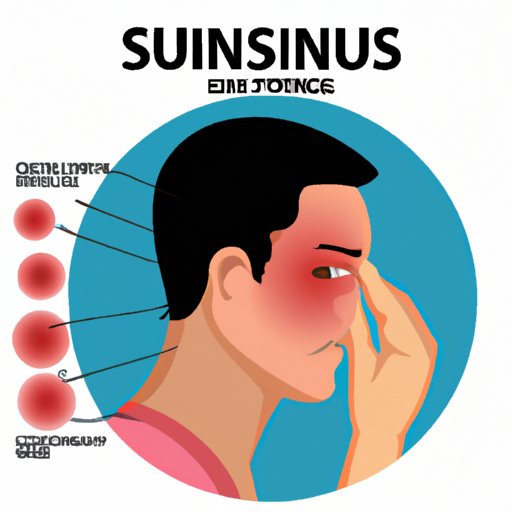
I. Introduction
Sinus infections, also known as sinusitis, are a common health condition that affects millions of people every year. Your sinuses are hollow spaces in the bones around your nose and forehead that are lined with mucus membranes. When these membranes become inflamed and infected, it can cause a wide range of uncomfortable symptoms. In this article, we explore how to tell if you have a sinus infection, the causes, diagnoses, treatments, and prevention of sinusitis.
II. Symptoms of a Sinus Infection
The most common symptoms of a sinus infection include sinus congestion, facial pain or pressure, and headaches. Other symptoms can include fever, coughing, and fatigue, which can indicate a more severe infection. Acute sinus infections usually last for a few weeks, while chronic sinus infections can last for over twelve weeks or reoccur frequently.
III. Causes of Sinus Infections
The three most common causes of sinus infections are bacteria, viruses, and allergies. Environmental factors like pollutants and smoke can also cause sinus infections. When your sinuses are blocked, it traps mucus and bacteria inside, leading to infection. The inflammation can occur in response to allergens such as pollen, mold, or dust mites. Avoiding these allergens is an important part of prevention of sinus infections.
IV. Diagnosis of Sinus Infections
Your doctor will examine the physical symptoms, such as nasal discharge, swelling, and tenderness around the forehead, nose, and eyes or behavior changes. Imaging tests like x-rays and CT scans can reveal abnormalities in the sinuses. Your medical history will be discussed to rule out any underlying causes of the infection, including allergies, immune deficiency, and structural issues with your sinuses. If the symptoms persist, see a doctor as soon as possible.
V. Treatment of Sinus Infections
The treatment of a sinus infection depends on the severity and duration of the symptoms. Home remedies such as nose irrigations, sinus massages, and steam treatment can provide relief from the discomforts of sinusitis. Over-the-counter medications like pain relievers and decongestants can also help relieve symptoms. If the infection persists, prescription corticosteroids, and antibiotics may be necessary. Working with your doctor is the best way to create a personalized plan for treatment.
VI. Prevention of Sinus Infections
Preventing sinus infections relies on a combination of lifestyle changes and avoiding triggers. Regular exercise and stress management can strengthen your immune system and improve your overall health. A healthy diet that’s rich in nutrients like vitamin C and vitamin A can also help bolster your immune system. Avoiding triggers like molds, pollutants, and smoke can help protect your sinuses from infection. You can also reduce your risk of sinus infections by getting a flu shot and other immunizations.
VII. Conclusion
Sinus infections can be a painful and uncomfortable condition, but there are many ways to prevent and treat them. Recognizing the symptoms early and seeking the appropriate medical care is the key to preventing complications and a faster recovery from sinusitis. By making lifestyle changes, avoiding triggers, and staying on top of preventive measures, you can protect your sinuses and maintain a healthy respiratory system.





